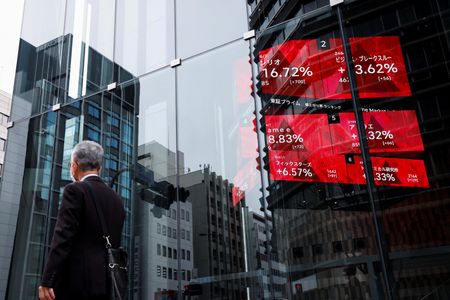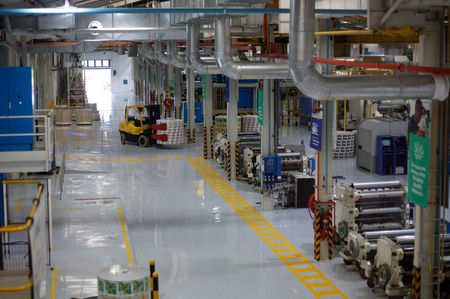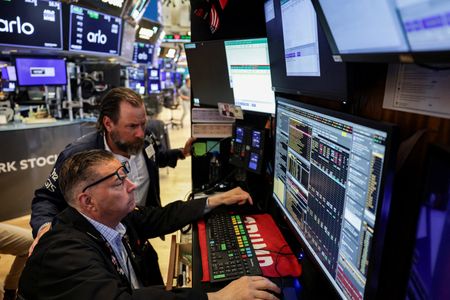By Rae Wee and Johann M Cherian
SINGAPORE (Reuters) -Global stocks advanced on Thursday, underpinned by optimism around artificial intelligence and the prospect of upcoming interest rate cuts, while investors kept a cautious eye on U.S. President Donald Trump’s tariff actions and their impact on global trade.
U.S. copper futures widened their premium to the London benchmark overnight after Trump announced plans to impose a 50% tariff on copper imports from August 1.
Trump also threatened a punitive 50% tariff on Brazil’s exports to the U.S. on Wednesday and issued tariff notices to seven minor trading partners.
The latest tariff moves did little to rattle markets as European stocks gained, with Germany’s DAX up 0.1% and UK’s FTSE 100 rising 1.2% to their respective all-time highs.
MSCI’s broadest index of Asia-Pacific shares outside Japan added 0.5%, while U.S. stock futures took a breather, with Nasdaq futures little changed a day after the tech-heavy index closed at a record high.
The market reaction to Trump’s latest moves was less severe than in April, largely reflecting expectations that ongoing negotiations between Washington and its trade partners could yield agreements before the deadline.
Markets “continue to shrug off Donald Trump’s daily tariff updates, perhaps seeing them as noise and not facts,” said Dan Coatsworth, investment analyst at AJ Bell.
Meanwhile, investors digested upbeat quarterly results from TSMC, which showed strong demand for the world’s largest contract chipmaker’s products, fuelled by surging interest in artificial intelligence applications.
TSMC’s report came a day after AI chip giant Nvidia became the world’s first public company to reach $4 trillion in market value. Other tech-related stocks in Korea and Japan further got a boost.
Traders are now gearing up for a crucial quarterly earnings season in Europe and in the U.S., and will scrutinize reports to gauge the impact trade uncertainty has had on corporate health.
Also keeping stocks supported were expectations of at least two interest rate cuts by the Federal Reserve this year.
Minutes released on Wednesday showed “most participants” at the Fed’s meeting last month anticipated rate cuts would be appropriate later this year, with any price shock from tariffs expected to be “temporary or modest.”
Later in the day, traders will parse a U.S. weekly jobless claims report and a 30-year bond auction by the U.S. Treasury.
BRAZIL UNDER PRESSURE
The Brazilian real slipped 0.6%, languishing near a one-month low at 5.5826 per dollar owing to Trump’s tariff threat on Latin America’s largest economy.
The real’s volatility gauges spiked to the highest since late April when markets were still trying to get to grips with Trump’s tariff threats.
“Without a clear path yet to de-escalation, the real is likely to continue to trade on a softer footing in the near-term. The initial real sell-off was exacerbated by the unwind of popular carry trades,” Lee Hardman, a senior currency economist at MUFG, said.
In a typical carry trade, investors borrow in a low-interest currency to buy higher-yielding assets in other currencies.
“The risk is that carry trades continue to be unwound on the back of heightened trade risks and higher financial market volatility triggering a further reversal of real gains.”
Brazilian stocks were heading for another grim day, with U.S.-listed shares of local companies and banks deep in the red during premarket trading.
In cryptocurrencies, bitcoin was pinned near a record high and was last at $111,161.49, while ether was up 1.4% to $2,779.64.
Elsewhere, crude prices slipped 0.4% with Brent futures down to $69.95 per barrel, while U.S. crude dropped to $68 a barrel. [O/R]
Spot gold rose 0.37% to $3,325.39 an ounce. [GOL/]
(Reporting by Rae Wee, Johann M Cherian and Marc Jones; Editing by Jamie Freed, Bernadette Baum and Tomasz Janowski)










